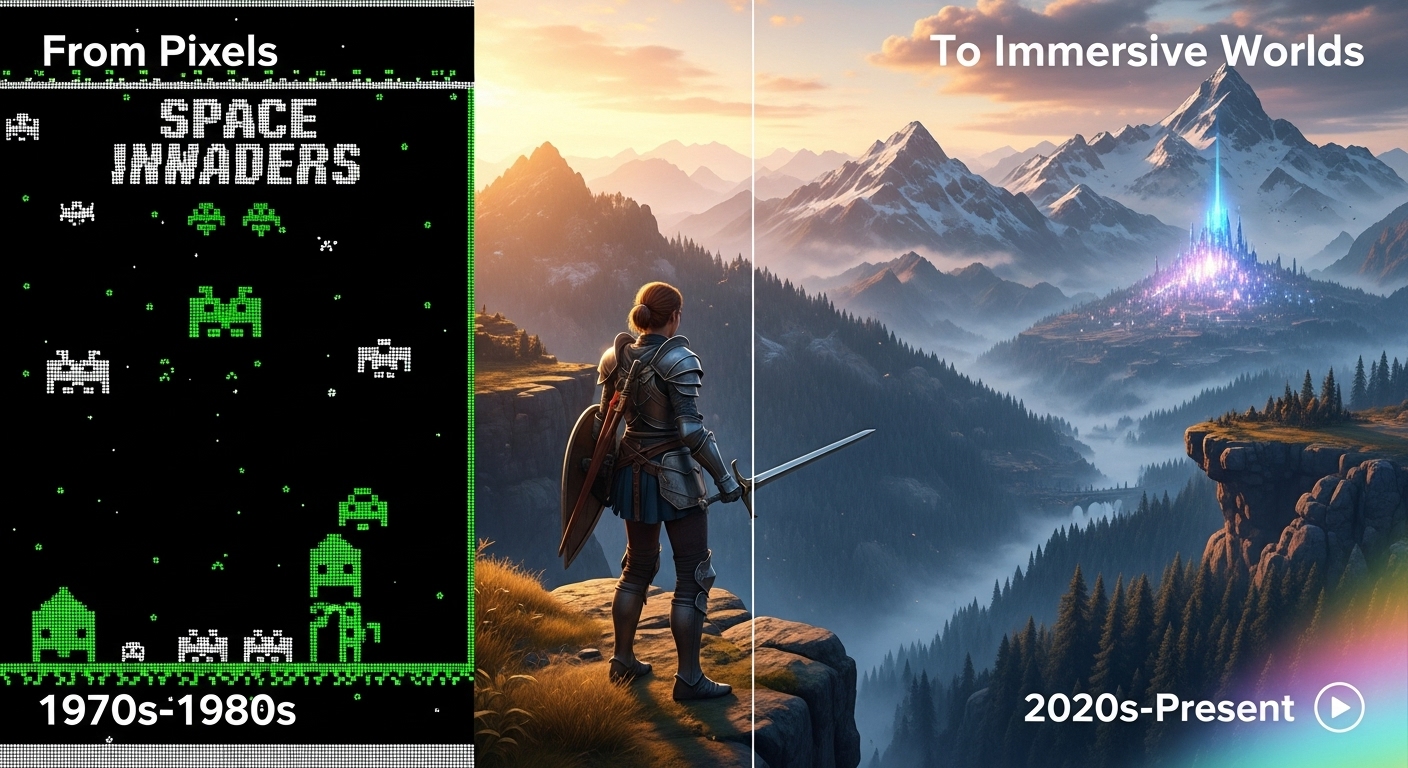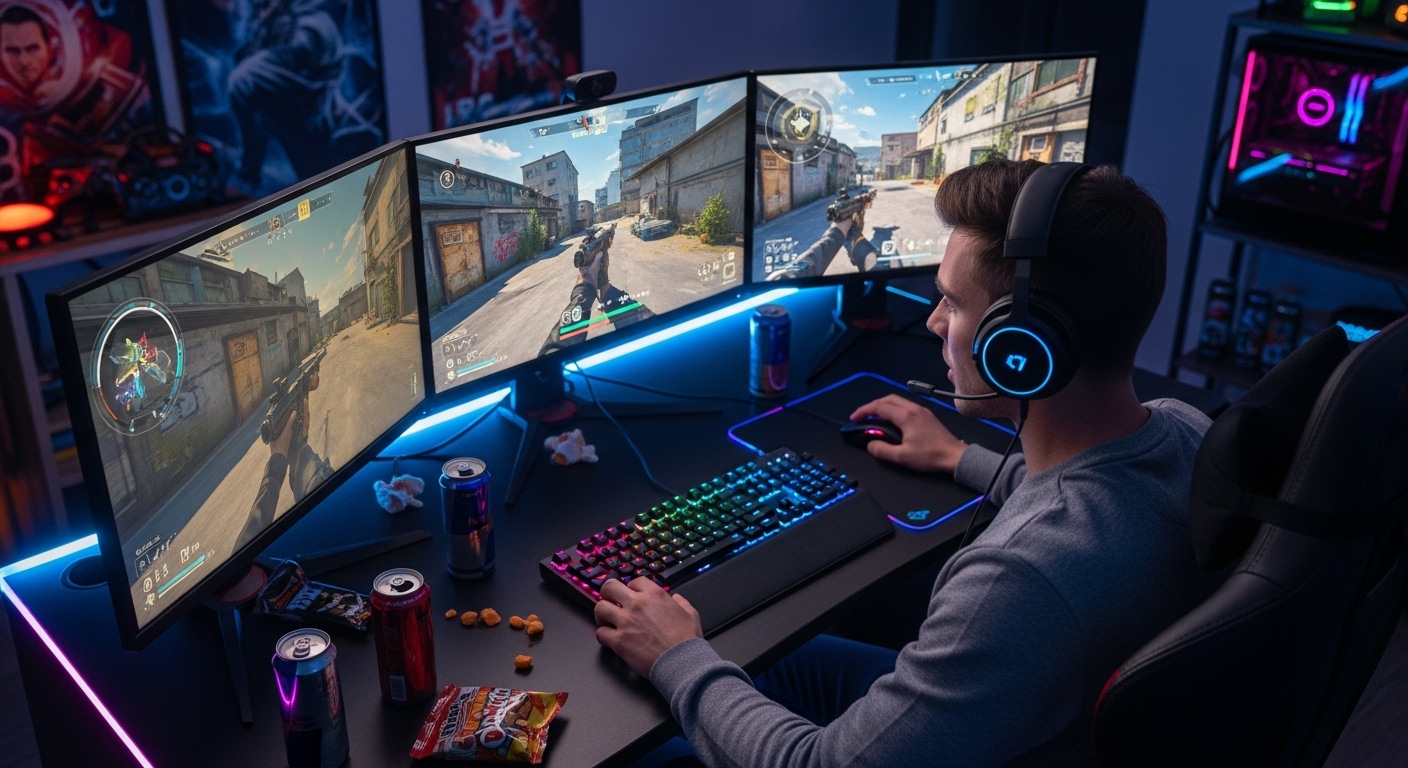Introduction
Gaming is no longer a niche hobby; it has become one of the most powerful industries in the world. What once started as pixelated adventures on bulky machines has transformed into immersive virtual experiences that blend art, technology, and human imagination. From the early days of arcade cabinets to the complex worlds of virtual reality, gaming continues to evolve at a staggering pace.
In this blog, we’ll take a deep dive into the fascinating journey of gaming — exploring its roots, technological leaps, cultural significance, and what the future holds. Whether you’re a lifelong gamer or simply curious about this global phenomenon, this exploration will show why gaming is more than just entertainment — it’s a reflection of human creativity and connection.
The Birth of Gaming: The Pixel Era
The story of gaming began humbly in the 1950s and 60s, when computers were massive machines that filled entire rooms. Scientists and engineers started experimenting with ways to use these machines for recreation and learning. Games like Tennis for Two and Spacewar! were simple, yet revolutionary, as they showed that computers could entertain as well as calculate.
It was in the 1970s that gaming truly began to take shape as a public phenomenon. The release of Pong in 1972 by Atari changed everything. It was a simple game — just two paddles and a bouncing ball — but it ignited a new industry. Arcades began popping up around the world, filled with blinking lights, coins, and the sounds of competition. The birth of gaming culture had begun.
The Rise of Home Consoles
While arcades dominated public spaces, the 1980s introduced the magic of home gaming. Systems like the Atari 2600 and later the Nintendo Entertainment System (NES) brought games into living rooms everywhere. Suddenly, gaming was not just an outing — it was a shared family experience.
Games like Super Mario Bros., The Legend of Zelda, and Metroid became household names. These titles didn’t just entertain; they taught players about exploration, problem-solving, and creativity. The idea of a “video game hero” became a part of global culture, inspiring generations of children to dream beyond the limits of reality.
The 1980s also saw fierce competition among companies, each pushing the limits of technology. The idea of game design as an art form began to emerge, with designers crafting not just mechanics but worlds, stories, and emotional experiences.
The 1990s: A Decade of Innovation
The 1990s were a golden age for gaming. It was the decade that saw the transition from 2D to 3D, forever changing the way games were played and perceived. Titles like Super Mario 64, Final Fantasy VII, and The Legend of Zelda: Ocarina of Time redefined what gaming could be — blending cinematic storytelling with interactive worlds.
This era also saw the birth of major gaming franchises that still thrive today. Resident Evil introduced survival horror. Gran Turismo brought realistic racing simulation. Pokémon created a universe of collecting, battling, and trading that captivated millions. The rise of the PlayStation marked Sony’s entry into the console war, introducing CD-based games and pushing graphical fidelity to new levels.
For PC gamers, this was the dawn of online multiplayer. Titles like Quake and StarCraft created communities long before social media existed. Gaming became social, competitive, and deeply immersive.
The 2000s: The Age of Connectivity
The new millennium ushered in a dramatic shift in how games were played and shared. With the rise of the internet, gaming became a global experience. The launch of Xbox Live in 2002 revolutionized multiplayer gaming, allowing players from different continents to compete and collaborate in real time.
Games like Halo 2, World of Warcraft, and Counter-Strike shaped the early days of online gaming communities. Clans, guilds, and eSports began to form — giving rise to a new kind of fame, where top players became celebrities within the gaming world.
The 2000s were also the age of storytelling mastery. Games like Shadow of the Colossus, Bioshock, and Mass Effect proved that interactive entertainment could deliver emotional and philosophical depth equal to films or books. Players were no longer just observers; they were participants in the story, shaping outcomes with their choices.
The Rise of Mobile and Casual Gaming
As smartphones became a part of everyday life, gaming once again transformed. Suddenly, everyone could be a gamer. Titles like Angry Birds, Candy Crush, and Clash of Clans reached millions of people who had never touched a console or PC.
Mobile gaming democratized the medium. It removed barriers of cost and complexity, inviting people of all ages and backgrounds to play. The idea of gaming as a “time-waster” evolved into gaming as a lifestyle. Whether waiting for a bus or relaxing at home, people found joy in short, engaging experiences that fit into their daily routines.
This explosion also gave rise to indie developers. Small teams — sometimes just one person — could now create and publish games to global audiences through app stores. The creativity of the gaming world expanded beyond big studios to include voices and ideas from all over the globe.
The Modern Gaming Landscape
Today, gaming is a multi-billion-dollar industry that spans continents, cultures, and generations. Modern consoles like the PlayStation 5, Xbox Series X, and Nintendo Switch showcase breathtaking visuals and complex gameplay mechanics that rival Hollywood productions. Meanwhile, PC gaming continues to push technical limits with advanced hardware and customizable experiences.
Streaming and content creation have added another dimension to gaming. Platforms like Twitch and YouTube Gaming allow players to share their experiences live, creating entire communities around games. Streamers and content creators now influence gaming trends, review new titles, and even collaborate with developers.
Cloud gaming services have begun to change how people access games. Instead of downloading massive files, players can stream games directly to their devices — similar to watching movies online. This represents another leap in accessibility, allowing anyone with a stable internet connection to experience high-end games without expensive hardware.
eSports: The New Arena
Competitive gaming, or eSports, has grown from small tournaments to massive global events with millions of viewers. Games like League of Legends, Dota 2, Counter-Strike: Global Offensive, and Valorant dominate the scene, with professional players earning sponsorships, salaries, and global recognition.
Stadiums fill up for gaming championships, and prize pools reach into the tens of millions. eSports organizations operate much like traditional sports teams, with training facilities, coaches, and analysts. What was once seen as a hobby is now a legitimate career path for talented players.
eSports also emphasizes the power of community. Fans follow their favorite teams, debate strategies, and celebrate victories just like in football or basketball. Gaming has blurred the lines between virtual and real-world competition.
Gaming as Art
Over the years, gaming has evolved from simple entertainment into an art form. The visual design, music, writing, and interactivity combine to create emotional and thought-provoking experiences. Titles like Journey, The Last of Us, and Red Dead Redemption 2 have demonstrated that games can evoke deep emotions — love, loss, hope, and redemption.
Game developers have become storytellers, blending cinematic techniques with interactive design. Players don’t just watch a story unfold; they live it, shape it, and experience it firsthand. This interactivity makes gaming a unique form of artistic expression — one that no other medium can replicate.
The Social Impact of Gaming
Gaming has grown beyond entertainment to influence society in profound ways. It builds communities, fosters collaboration, and enhances skills like problem-solving, teamwork, and creativity. Many games encourage strategic thinking and perseverance, teaching valuable life lessons in virtual worlds.
Online gaming has also connected people across borders. Players form friendships and alliances that transcend geography, language, and culture. In an increasingly divided world, gaming provides a rare space where cooperation and shared experiences can thrive.
However, gaming’s social impact isn’t without challenges. Concerns about addiction, toxicity, and online harassment have led to conversations about responsible gaming. Developers and communities are working together to create safer, more inclusive spaces for all players.
The Psychology of Play
Why do we play games? Psychologists have long studied the motivations behind gaming, finding that it satisfies fundamental human needs — achievement, connection, and exploration. Games provide a sense of progress and mastery that can be deeply rewarding. They also offer escape, allowing players to step into different worlds and identities.
For many, gaming is a form of relaxation, a way to relieve stress and recharge. For others, it’s a creative outlet or a platform for self-expression. Multiplayer games, in particular, tap into the social nature of humans, creating bonds through shared challenges and victories.
Interestingly, research also shows that gaming can improve cognitive skills. Hand-eye coordination, multitasking, and decision-making often develop through gameplay. Even simple puzzle games can enhance pattern recognition and problem-solving abilities.
Diversity and Representation in Gaming
As gaming has grown, so too has the call for diversity and inclusion. Players from all backgrounds want to see themselves represented in the games they play. Developers are responding with richer stories, more diverse characters, and settings that reflect the global community.
Representation matters because games influence perception. Seeing strong, complex characters from different genders, ethnicities, and identities helps create empathy and understanding. Indie games, in particular, have been at the forefront of exploring themes of identity, culture, and social issues.
This movement has made gaming more vibrant and meaningful. It has reminded the industry that every player deserves to feel seen, heard, and valued.
The Future of Gaming: Beyond Reality
The future of gaming promises to be even more extraordinary. Virtual reality (VR) and augmented reality (AR) are already redefining immersion. With VR headsets, players can step inside their favorite worlds, interacting with them physically. AR brings digital elements into real environments, blending the virtual with the tangible.
Artificial intelligence is also transforming game design. AI-driven characters can adapt to player behavior, making every playthrough unique. Procedural generation allows developers to create vast, dynamic worlds that evolve over time.
The concept of the “metaverse” — a shared, persistent virtual universe — represents the next frontier. It envisions a space where gaming, socializing, and digital economy coexist seamlessly. In such worlds, players might not just play games, but build, trade, and create entire virtual lives.
Gaming and Education
One of the most exciting developments in recent years is the use of gaming in education. Educational games make learning interactive and fun, engaging students more effectively than traditional methods. From language learning to history simulations, games turn abstract concepts into hands-on experiences.
Gamification — the integration of game elements into non-game contexts — is also transforming workplaces and classrooms. Points, rewards, and challenges motivate people to participate and achieve goals. This approach leverages the psychology of play to enhance real-world performance.
Even beyond structured learning, games teach resilience. Failing and trying again is part of every gamer’s journey, fostering a mindset that values effort and improvement over instant success.
The Business of Gaming
Economically, gaming is one of the largest entertainment sectors in the world. It surpasses film and music industries combined in annual revenue. Game development now involves massive teams, intricate production pipelines, and sophisticated marketing strategies.
The rise of digital distribution platforms has also changed how games are sold and maintained. Players can download titles instantly, receive updates, and access new content through expansions or seasonal events. Subscription models, microtransactions, and free-to-play systems have diversified how developers earn revenue.
While monetization models have sparked debate, they have also supported longer-lasting games that evolve over time. Titles like Fortnite and Genshin Impact are constantly updated, keeping players engaged for years rather than weeks.
The Power of Community
Perhaps the most powerful force in gaming is its community. Players come together not only to compete but to create, share, and celebrate their love for games. Fan art, mods, and online discussions extend a game’s lifespan far beyond its release date.
Community-driven development has become a core part of modern gaming. Developers listen to feedback, host betas, and invite players to shape the evolution of their favorite titles. This collaboration has turned gaming into a living, breathing ecosystem of creativity and passion.
Gaming conventions, tournaments, and fan festivals further reinforce this sense of belonging. For many players, gaming is not just a hobby — it’s an identity, a community, and a culture that continues to grow.
Conclusion: The Infinite Game
Gaming is more than pixels, controllers, or scores. It is a reflection of human imagination, a testament to our desire to explore, create, and connect. From the dimly lit arcades of the 1970s to the expansive virtual worlds of today, gaming has evolved into a force that shapes art, technology, and society.
As we look to the future, one truth remains: gaming is an infinite game. It never truly ends. Each new generation of players and creators will push boundaries, tell new stories, and discover new ways to play.
Gaming is not just about winning or losing — it’s about the experience, the journey, and the shared joy of play. It’s about finding wonder in the digital worlds we create and realizing that, in many ways, those worlds reflect who we are and who we aspire to be.



